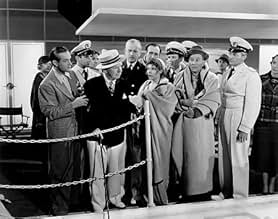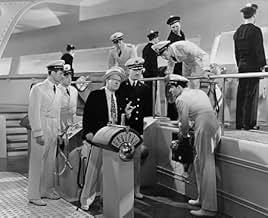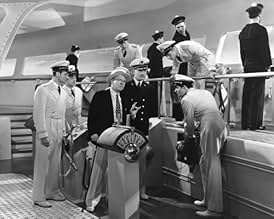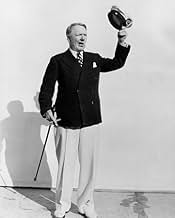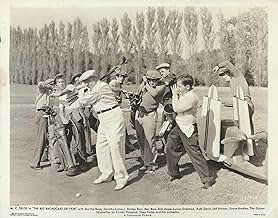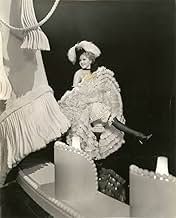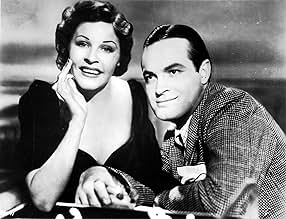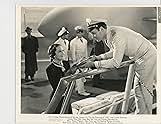IMDb RATING
6.1/10
1.2K
YOUR RATING
The Bellows family causes comic confusion on an ocean liner, with time out for radio-style musical acts.The Bellows family causes comic confusion on an ocean liner, with time out for radio-style musical acts.The Bellows family causes comic confusion on an ocean liner, with time out for radio-style musical acts.
- Won 1 Oscar
- 5 wins total
Leif Erickson
- Bob Hayes
- (as Leif Erikson)
Virginia Vale
- Joan Fielding
- (as Dorothy Howe)
Featured reviews
The trans-Atlantic race is on between the two great ocean liners, the Colossal and the Gigantic. On board the Gigantic (or is it the Colossal? Not even all of the passengers are sure) is an assortment of characters who present us with a sort of variety show over the course of the voyage:
The plot is an uneven mishmash, but some good songs stand out. Lamour sings "You Took the Words Right Out of My Heart," a lovely ballad. Raye does one called, "Mama, That Moon Is Here Again," which builds into a wild acrobatic dance in which sailors toss Martha all around the deck. The performance by Hope and Ross of "Thanks for the Memory" is truly excellent—it's a bittersweet song that we all know and yet it actually means something in its context of two old lovers hashing over regrets and falling back in love. It's a wonderfully touching and low key performance.
In between these highlights is a lot of nonsense, some of it amusing. The plot doesn't exactly buzz along—it stops and starts too much before ultimately drawing to a rather hasty resolution at the end of the voyage. It is kind of like of a big broadcast, a radio all star variety program, I suppose. Taken as a whole, it's really not that great a picture—but it's certainly worth seeing for the sake of its numerous highlights.
- W.C. Fields, ship's owner. He stops on the way to the pier for a game of golf ("Stand clear, keep your eye on the ball," he tells his large team of caddies) and so has to catch up with the ship by flying in on his mini-helicopter. He's nuts. He has a daughter...
- Martha Raye: According to pop Fields, "She's an unfortunate girl .Seven years ago, she crashed an aeroplane in a mirror factory. Broke 9,831 mirrors."
- Bob Hope: A radio announcer broadcasting updates on the race, he is accompanied on the journey by his three ex-wives, who intend to prevent prospective wife number four from cutting into their alimony checks ("She can't chisel me down to any 25%....").
- Dorothy Lamour, who has second thoughts about becoming that fourth wife when she meets
- Leif Erickson, handsome and brilliant young engineer who has designed the special propulsion system for the ship.
- Shirley Ross, one of the ex-wives. She and Hope get to chatting and can't quite remember why they ever divorced in the first place.
The plot is an uneven mishmash, but some good songs stand out. Lamour sings "You Took the Words Right Out of My Heart," a lovely ballad. Raye does one called, "Mama, That Moon Is Here Again," which builds into a wild acrobatic dance in which sailors toss Martha all around the deck. The performance by Hope and Ross of "Thanks for the Memory" is truly excellent—it's a bittersweet song that we all know and yet it actually means something in its context of two old lovers hashing over regrets and falling back in love. It's a wonderfully touching and low key performance.
In between these highlights is a lot of nonsense, some of it amusing. The plot doesn't exactly buzz along—it stops and starts too much before ultimately drawing to a rather hasty resolution at the end of the voyage. It is kind of like of a big broadcast, a radio all star variety program, I suppose. Taken as a whole, it's really not that great a picture—but it's certainly worth seeing for the sake of its numerous highlights.
There are momentary gems in this movie, and I recently bought the DVD because I fondly remembered it from its television broadcasts during my childhood. Hope and Ross's "Thanks for the Memory" (that's the actual spelling; it isn't plural) is so well portrayed that it seems they are recalling actual moments from their lives. This is almost the only moment of sincerity in this otherwise farcical fluff-piece. Martha Raye's "Oh, Mama!" is eye-popping primarily because I believe she did her own stunts in it, and she is bandied about like an unlucky mouse caught by a gruesomely playful puss. WC Fields sparks frequent smirks with his ostentatious manner combined with total buffoonery. Dorothy Lamour is only pleasant; I don't believe she had yet found her spark for comedy that was later displayed in the Hope & Crosby Road Movies. Her song (she only gets one but sings it ad infinitum to Leif Erickson), along with the remainder of the musical score, is surprisingly engaging. All in all an enjoyable musical comedy review, designed so audiences could finally see the faces of the performers they invited into their living rooms through the radio.
The "plot" of this slapdash musical concerns a transatlantic ship race between two new "super-ships", the Gigantic and the Colossal. On board the former, S.B. Bellows (W.C. Fields), the brother of shipping line boss T. Frothingill Bellows (also Fields), tries to ensure that his ship wins, although he spends most of his times in drunken calamities. Also on board is entertainment host Buzz Fielding (Bob Hope), who takes time in between introducing musical acts to rekindle romance with one of his ex-wives (Shirley Ross), while his current girlfriend (Dorothy Lamour) falls for handsome ship radioman Bob (Leif Erickson). Things get even more chaotic when Bellows' daughter Martha (Martha Raye) comes aboard. Also featuring Ben Blue, Grace Bradley, Lynne Overman, Patricia Wilder, Rufe Davis, Lionel Pape, Virginia Hale, James Craig, Richard Denning, Monte Blue, Mae Busch, Leonid Kinskey, Bernard Punsly, and Russell Hicks.
Seemingly assembled from bits of different movies awkwardly stitched together, there's some funny stuff here, but no kind of pacing or interesting narrative. Fields, who was making his final Paramount film here, is funny, and his golf game and billiards game scenes are top notch. Bob Hope, making his feature debut, sings his signature song. I was pleasantly surprised to see future Road co-star Lamour already working with him. Martha Raye gets a rather impressive song and dance number that gets acrobatic and she obviously didn't use a double. The music numbers are an odd lot, too, with a couple of songs by Mexican star Tito Guizar, a performance from Norwegian opera diva Kirsten Flagstad (doing Wagner's "Brunnhilde's Battle Cry"), and Shep Fields and His Rippling Rhythm Orchestra doing "This Little Ripple Had Rhythm" which combines live action with animation to show the "origin" of the "rippling rhythm", which apparently was an ambulatory blob of swamp water that separates from a bog and walks to Fields' band and teaches them. It makes as much sense as it sounds. The movie won the Oscar for Best Song ("Thanks for the Memory").
Seemingly assembled from bits of different movies awkwardly stitched together, there's some funny stuff here, but no kind of pacing or interesting narrative. Fields, who was making his final Paramount film here, is funny, and his golf game and billiards game scenes are top notch. Bob Hope, making his feature debut, sings his signature song. I was pleasantly surprised to see future Road co-star Lamour already working with him. Martha Raye gets a rather impressive song and dance number that gets acrobatic and she obviously didn't use a double. The music numbers are an odd lot, too, with a couple of songs by Mexican star Tito Guizar, a performance from Norwegian opera diva Kirsten Flagstad (doing Wagner's "Brunnhilde's Battle Cry"), and Shep Fields and His Rippling Rhythm Orchestra doing "This Little Ripple Had Rhythm" which combines live action with animation to show the "origin" of the "rippling rhythm", which apparently was an ambulatory blob of swamp water that separates from a bog and walks to Fields' band and teaches them. It makes as much sense as it sounds. The movie won the Oscar for Best Song ("Thanks for the Memory").
I really don't understand what some people expect when they watch an old movie like this. This one in my estimation, is light hearted and entertaining. It is a showcase for some of our greatest stars as they were just starting out. Is it their best effort? Probably not. But it is fun to watch if you don't take it too seriously. I'm awfully glad we have it around to watch. Being a fan of almost every star in it, I consider it a treasure chest of many favorites talent. W.C. Fields is wonderful through out the film. Some of his skits are hilarious! Bob Hope is so good in his role that you have to really feel sorry for his character. Of course the song "Thanks For The Memories" is forever linked to him with this film. Martha Ray is hilarious in another one of her zany roles. All in all, a very good and entertaining film to be watched over and over. A real, or reel part of history.
One must have at least a passing familiarity with the 1930s to understand and/or enjoy "The Big Broadcast of 1938". Without that, the movie is a curio piece to be remembered only as Bob Hope's first major film appearance and the one where he first sang "Thanks for the Memory" (soon to be his theme); W.C. Fields's last film for Paramount; and, perhaps if you're of a certain age, Martha Raye and Dorothy Lamour.
"The Big Broadcast of . . . " series of films were strictly pastiche: an odd mixture of familiar film faces, radio personalities, and vaudeville, burlesque and novelty acts with an extremely loose storyline stringing it all together. For 10¢ and the B-picture with an A-picture double-bill, the movie would have hit the spot for most Depression-era movie-goers.
The humour and jokes are pretty period specific, making the movies already out-of-date even ten years later. Without a map and a compass, the territory would be unfamiliar to audiences 70 years later. But that's not unique to "The Big Broadcast of . . . " series either. How well will "Canonball Run", "Airplane", "Scary Movie" and "Meet the Spartans" (all products of their time) hold up in 70 years? As others have stated, the best segment of the film is Hope and Shirley Ross singing the very tender and bittersweet, "Thanks for the Memory". Don't expect much from "The Big Broadcast of 1938", view it as the mind-candy of your great-, grand- or parents' generation.
"The Big Broadcast of . . . " series of films were strictly pastiche: an odd mixture of familiar film faces, radio personalities, and vaudeville, burlesque and novelty acts with an extremely loose storyline stringing it all together. For 10¢ and the B-picture with an A-picture double-bill, the movie would have hit the spot for most Depression-era movie-goers.
The humour and jokes are pretty period specific, making the movies already out-of-date even ten years later. Without a map and a compass, the territory would be unfamiliar to audiences 70 years later. But that's not unique to "The Big Broadcast of . . . " series either. How well will "Canonball Run", "Airplane", "Scary Movie" and "Meet the Spartans" (all products of their time) hold up in 70 years? As others have stated, the best segment of the film is Hope and Shirley Ross singing the very tender and bittersweet, "Thanks for the Memory". Don't expect much from "The Big Broadcast of 1938", view it as the mind-candy of your great-, grand- or parents' generation.
Did you know
- GoofsNear the end of the movie the helmsman said that the S.S. Gigantic was diesel powered. That would mean that the liner's proper name would be MV (Motor Vessel) Gigantic as opposed to SS (Stream Ship) Gigantic.
- Quotes
First reporter: Say, do you know anything about electricity?
S.B. Bellows: My father occupied the chair of applied electricity at State Prison.
- ConnectionsFeatured in Hollywood and the Stars: The Fabulous Musicals (1963)
- SoundtracksThis Little Ripple Had Rhythm
(uncredited)
Music by Ralph Rainger
Performed by Shep Fields and His Rippling Rhythm Orchestra
- How long is The Big Broadcast of 1938?Powered by Alexa
Details
- Release date
- Country of origin
- Language
- Also known as
- Radioparaden 1938
- Filming locations
- Eastern Service Studios, Astoria, Queens, New York City, New York, USA(sequence: Kirsten Flagstad aria)
- Production company
- See more company credits at IMDbPro
- Runtime
- 1h 31m(91 min)
- Color
- Aspect ratio
- 1.37 : 1
Contribute to this page
Suggest an edit or add missing content

